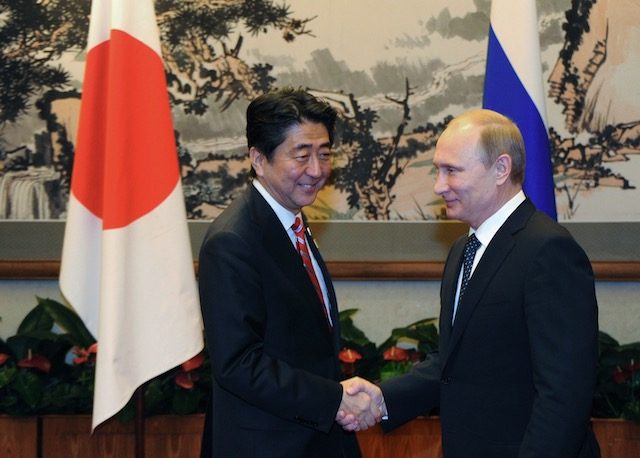SUMMARY
This is AI generated summarization, which may have errors. For context, always refer to the full article.

SOCHI, Russia – Japanese Prime Minister Shinzo Abe will meet Russian President Vladimir Putin on Friday, May 6, in the Black Sea resort of Sochi in a bid to bolster ties and seek to resolve a decades-long territorial dispute.
Tokyo-Moscow relations have been hamstrung by the row dating back to the end of World War II when Soviet troops seized the 4 southernmost islands in the Pacific Kuril chain, known as the Northern Territories in Japan.
Japan and Russia’s lingering tensions have prevented them ever signing a peace treaty to formally end World War II hostilities, hindering trade and investment ties.
“This is a complex, multi-faceted issue that can only be resolved in a manner acceptable to both sides through an even deeper partnership between the two countries,” Putin’s chief foreign policy advisor Yury Ushakov said ahead of the visit.
Japanese Foreign Minister Fumio Kishida said in April that Russia and Japan had agreed to start negotiations on signing a peace treaty “as soon as possible” after the meeting.
His Russian counterpart Sergei Lavrov on a visit to Tokyo last month said Russia wants to “move forward” in relations, but is not prepared to budge on the “result of World War II”.
Putin said during a public phone-in in April that he thinks “a compromise could be found at some point – and it will be found” on the territorial dispute.
Moscow hopes the meeting will help create a “constructive atmosphere in bilateral relations”, but “immediate serious progress” is unlikely, Kremlin spokesman Dmitry Peskov warned.
Lingering tensions
Despite the warmer words from the Kremlin, tensions between the two sides continue to surface and Japan has hit Russia with sanctions over the Ukraine crisis.
Russia has in turn angered Japan recently by building new modern compounds for its troops stationed on two of the disputed islands.
Russian Prime Minister Dmitry Medvedev also infuriated Tokyo by visiting one of the islands, home to some 19,000 Russians, last year.
Putin said last month he welcomed Abe’s visit as it comes despite “pressure from (Japan’s) partners, particularly the United States”.
Abe will later this month host a summit of the Group of Seven advanced industrial countries, from which Russia has been excluded over its annexation of Crimea.
“Evidently Japan will try to act as a kind of middleman in the talks process between Russia and the US,” Russia’s government newspaper the Rossiiskaya Gazeta said Thursday, May 5.
US President Barack Obama reportedly asking Abe in February to postpone his trip to Russia, according to sources quoted by Japan’s Kyodo news agency.
Writing in pro-Kremlin daily Izvestia on Thursday, a former deputy foreign minister and ambassador to Tokyo, Alexander Panov, suggested the meeting could see “Japan drop a number of sanctions” it imposed on Russia over Ukraine.
The leaders are expected to discuss a long-planned visit by Putin to Japan this year, after Lavrov last month urged Tokyo to give a firm date.
The Kremlin said they were also set to discuss economic ties, with Moscow saying their trade turnover last year fell 31 percent due to low oil prices.
“Japanese business and banks are not in a rush to invest in the Russian economy, preferring to wait for better times,” wrote the Rossiiskaya Gazeta. – Anna Malpas, AFP / Rappler.com
Add a comment
How does this make you feel?
There are no comments yet. Add your comment to start the conversation.